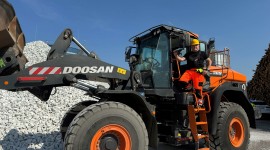Vytautas Kazlauskas, who has been working as a dock operator for more than 30 years, told Delfi that one of the most memorable events in his work was when he had to load hundreds of oxen. A conversation with Vytautas about the peculiarities of his work as a dock operator, his career and the most memorable events in the port.
- First of all, tell us what is a dock operator? What is the job like?
- A dock operator is a dockworker who works in a cargo terminal with a wide range of cargo handling equipment. The main function is to load various types of cargo to and from ships, road vehicles, rail wagons,... Here's just one of the ships being loaded at our terminal quay at the moment - the rubble is going into the wagons. We also load cement from ships into cement tanks, then onto incoming road transport. If we load bulk cargo onto ships, we do so with the help of so-called "loaders". These are the main jobs. And, yes, keeping the area tidy.
- A dock operator is a dockworker who works in a cargo terminal with a wide range of cargo handling equipment. The main function is to load various types of cargo to and from ships, road vehicles, rail wagons,... Here's just one of the ships being loaded at our terminal quay at the moment - the rubble is going into the wagons. We also load cement from ships into cement tanks, then onto incoming road transport. If we load bulk cargo onto ships, we do so with the help of so-called "loaders". These are the main jobs. And, yes, keeping the area tidy.
- As you can see, there is a wide range of equipment used to transport and load cargo here at MĮT. Which machinery do you need to use on a daily basis?
- I am a dock operator with a lot of experience and seniority, and my job category means that I operate all wheeled machinery except cranes. These include mini loaders, front loaders, loaders, belt conveyors, tractors, harbour trucks, forklift trucks and others.
- I am a dock operator with a lot of experience and seniority, and my job category means that I operate all wheeled machinery except cranes. These include mini loaders, front loaders, loaders, belt conveyors, tractors, harbour trucks, forklift trucks and others.
- And how are dockers categorised? How many dockers do you have here? Tell us more.
- We are all the same, it's just the category that differs slightly. For example, a young docker who cannot operate one or another machine by category is still learning and starts with the smallest loader. But if you have to operate more serious equipment, you need to have the "right" - the category - to learn how to operate the equipment properly and to go through courses, training, etc. For example, a crane operator is also a dock mechanic, as he can also operate a front loader if necessary. In short, we are all versatile. In total, there are about 50 employees at MĮT, of which about 40 are production workers, as well as locksmiths and welders. Our dock operators number about 25.
- We are all the same, it's just the category that differs slightly. For example, a young docker who cannot operate one or another machine by category is still learning and starts with the smallest loader. But if you have to operate more serious equipment, you need to have the "right" - the category - to learn how to operate the equipment properly and to go through courses, training, etc. For example, a crane operator is also a dock mechanic, as he can also operate a front loader if necessary. In short, we are all versatile. In total, there are about 50 employees at MĮT, of which about 40 are production workers, as well as locksmiths and welders. Our dock operators number about 25.
- How long have you been a dock operator?
I have been working for one port company for 15 years, and I have been working for the MĮT for 18 years - that's well over 30 years of experience.
I have been working for one port company for 15 years, and I have been working for the MĮT for 18 years - that's well over 30 years of experience.
Full interview on Delfi website.

